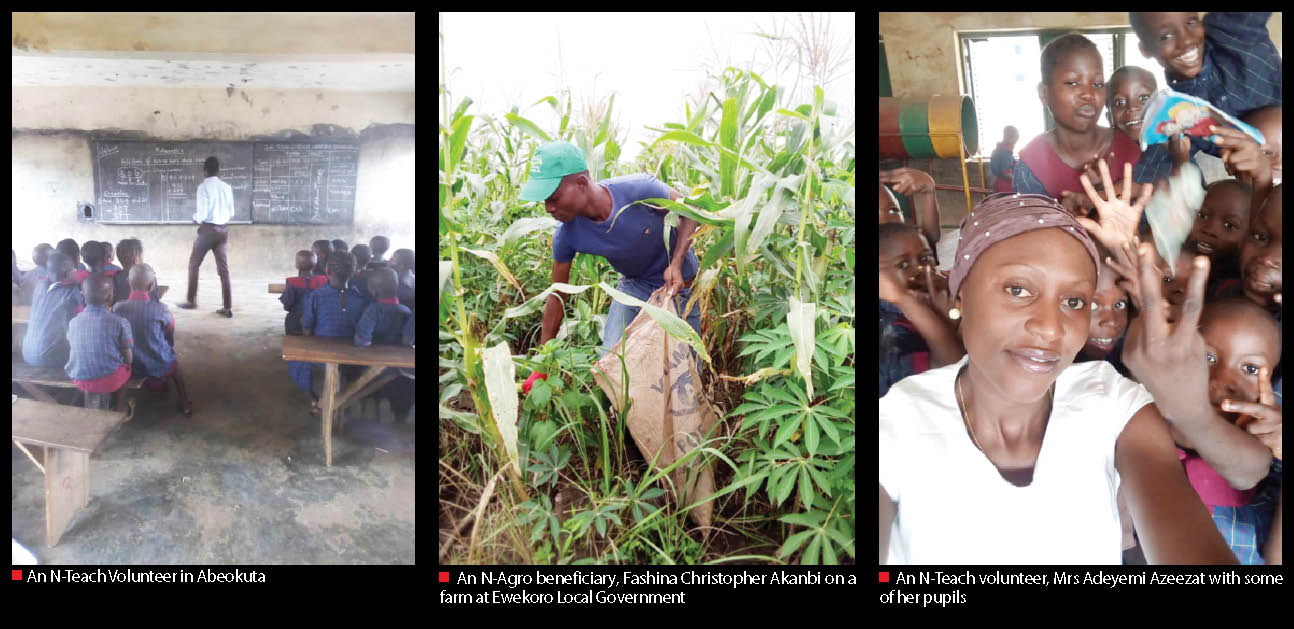How we have fared with N-Power – Beneficiaries
Of the N-Power beneficiaries in the federal government’s Social Intervention Programmes (SIP) across the country, about 15, 000 were picked from Ogun State for the 2016 and 2017 batches and placed in critical sectors of agriculture, education and health. Nearly three years after, many speak on it. Since the introduction of N-Power programme in […]

How we have fared with N-Power – Beneficiaries
Of the N-Power beneficiaries in the federal government’s Social Intervention Programmes (SIP) across the country, about 15, 000 were picked from Ogun State for the 2016 and 2017 batches and placed in critical sectors of agriculture, education and health. Nearly three years after, many speak on it.
Since the introduction of N-Power programme in Ogun State, many beneficiaries say the successes have outweighed its failures. In the agriculture sector, an N-Agro volunteer, Femi Adewale said beneficiaries in the sub-component have acquired skills which “they could later be put to use in becoming large scale farmers.”
The graduate employee submitted that “If the N-Agro programme is maximised, there are a lot of benefits that can be derived from it on a long-term basis.” He equally argued that there is need for government to identify beneficiaries with business potentials and assist them with loans or grants.
“The programme to a reasonable extent has recorded some successes. For instance, some on the N-Agro programme have been able to acquire some skills which they can later use to become large scale farmers.
“About twenty of us came together and formed a cooperative society, registered with the government and made monthly contribution of certain amount of money as our capital to embark of agro-business ventures. We went into rice farming during the Ogun METRO rice project last year.
“But unfortunately, we recorded a huge loss due to some shortcomings in the part of the government. The people that handled the project were incompetent,” he explained.
While pointing out the challenges, he said “some of the shortcomings of the programme included the inability of the government to identify those with business potentials and support them with loans, grants.”
Also speaking with our correspondent, another N-Agro volunteer, Michael Adesanya described his experience as worthwhile. “Being enlisted in the scheme is one of the best things that happened to me in recent times. The experience has been worthwhile. At the onset, I thought N-Power was fake but got to know it was real when I was selected. It has helped me to know various opportunities in agriculture business which in turn can make every serious person into an entrepreneur and employer of labour. The successes are the opportunities that were abound in the scheme. The monthly allowance too is something that if properly saved could turn around any life,” Adesanya said.
Mrs Adeyemi Azeezat, another volunteer placed on N-Teach, who teaches at St Joseph RCM Isabo, Abeokuta, described the programme as “highly successful.” However, she wants the Federal Government to intensify training and workshop to enhance the teaching ability of those who didn’t study education.
She said “all I can say about the N-Teach programme in particular is that it’s a success. We in the second batch are placed on the field as assistant teachers while the previous set are now full time class teachers having understudied other teachers.
According to her, married N-Teach beneficiaries enjoy four months maternity leave and are also allowed to participate in other school activities like training workshop, inter-house sport and other end of year activities.
“I can say there is no sentiment or discrimination against us. There are also teams of government officials from the local government education authority, State Universal Basic Education Board and Quality Assurance who monitor our activities. However the issue of training and workshop needed to be intensified so as to improve the teaching ability of most people who didn’t study education at tertiary institution,” she remarked.
On his part, the N-Power State Coordinator, who is also a volunteer, Olalekan Mutairu said beneficiaries in N-Teach have successfully fixed the teachers’ deficit in Ogun State education system.
“At the N-Teach level which is particularly about the education of the nation, N-Power volunteers have been working tirelessly and have been more productive in the area. In Ogun State, there are several schools that lacked teachers. The work-force in schools is nothing to write home about even teachers who have retired are not replaced. Since 2011, the state government has not embarked on any open recruitment to replace teachers who have retired,” Mutairu said.
The major challenge facing the programme, according to him, is the state government’s indifference to absorb the beneficiaries fully into the civil service. “Our plight is the issue of absorption into the civil service. The state government believes it is a federal government project. But we all know that we are indirectly working for the state because most of the schools we were posted to are state-owned.
“We have met top politicians on the issue of our absorption but they kept promising,” he said.
In an interview with Daily Trust Saturday, the State Director of the National Orientation Agency (NOA) and a key stakeholder in the scheme, Sola Babalola applauded the scheme as highly successful and have reduced unemployment rate, trained beneficiaries to be qualified teachers and successful farmers.
Babalola identified inadequate mechanism to monitor and supervise performances of the volunteers as the bane of the scheme. He pointed out that the major challenge is monitoring. “There should be effective monitoring and supervision of beneficiaries to be sure they are really attending to their primary assignments. Over the years and in some cases, a number of them would have gotten something doing and in most cases, they don’t voluntarily resign from the scheme. And there is no appropriate way of monitoring them.
“They monitor from Abuja a times, but I think there is no comprehensive mechanism to monitor their performance on duty,” Babalola lamented.
